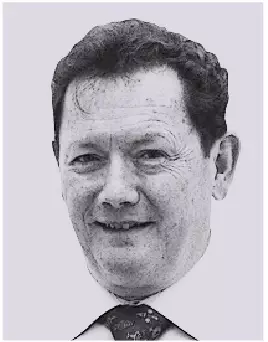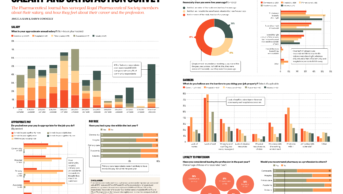
JL / Shutterstock.com
Community pharmacy has had a difficult few years. Many UK pharmacies have shut their doors for the last time, and more closures are looming as Boots is planning to close a further 200 stores by 2021.
In England, there were deep funding cuts in 2017 and, as of July 2019, overall investment in the sector has been frozen until 2024. The outlook is more positive in Wales and Scotland, where community pharmacy has recently received a boost in funding, but this is tied to providing more NHS services.
The results ofThe Pharmaceutical Journal’s ‘2019 Salary and Satisfaction Survey’ show that all of these factors have had a powerful effect on the morale of community pharmacists (see Box). Half of community pharmacists report either low or very low morale and — shockingly — more than three-quarters of community pharmacists would not recommend working in their sector of practice to others, an increase of five percentage points from 2018.
But there are still pockets of optimism. Community pharmacists are resilient and we asked a selection of them for practical ideas that could boost morale and make the sector more attractive to work in. In an ongoing era of austerity, we asked them to share their suggestions of what would make community pharmacy a better place to work.
Better staff mix

Source: Bhavisha Patel
When it is only you in the dispensary and you have prescriptions to dispense and self-check, the phone is ringing, people want to speak to the pharmacist and the expectation to deliver services is present, it can become overwhelming. Moreover, it is not safe practice under these conditions.
I need better staffing levels to support the dispensary while I see patients. For example, having a dispenser, counter assistant and a pharmacist at any given time.
Furthermore, training counter assistants to work in the dispensary can help prevent pharmacists self-checking, or have dispensers work alongside pharmacists who could go and serve at the counter as well as dispense.
Bhavisha Patel, part-time pharmacist manager, Day Lewis Pharmacy, Berkshire, and part-time locum pharmacist
Defined career progression

Source: Reena Barai
The pharmacists I employ are all patient-centred and clinically orientated so that each day when they interact with patients, they feel valued and respected. I know some community pharmacists that have become so ingrained in the supply function that they have lost sight of this, and hence morale drops.
There needs to be a career ladder (bands) created for community pharmacy, much like the hospital and primary care sector has. This could be linked with experience and postgraduate qualifications, so as you gain both, you move up the ladder.
There are opportunities developing within the new community pharmacy contractual framework over the next five years that will create new roles and services that community pharmacists can provide, and these will hopefully be the catalyst for change in this sector that is vitally needed.
Reena Barai, superintendent pharmacist, SG Barai Pharmacy, Sutton
Capitated payment for services

Source: Terry Maguire
Community pharmacy needs a workload focused on patients rather than prescriptions. We need services that allow us to make decisions that benefit patients.
These are contractual issues; payment for patient care rather than simply medicines supply. For example, clinical services that can be remunerated in the same way as GP contracts; capitation of patients, payment for treating some patients with diabetes, respiratory patients and end-of-life care. In addition, deprescribing is a service we need as a society.
We also need to have a system that supports career advancement in pharmacy practice. This could be achieved when a pharmacist’s remuneration is reflected in effective service delivery and competence to deliver that service.
Terry Maguire, superintendent pharmacist, Maguire Pharmacy, Belfast
Greater opportunities for portfolio working

Source: Ade Williams
How the contractual framework translates the NHS vision, with sustainable funding for community pharmacy to deliver services and support for upskilling, will shape the future. If we are able to see the vision of the ‘NHS long-term plan’ delivered with community pharmacy, supported and enumerated to champion new responsibilities and skills, this will create diverse roles.
Career progression should see more portfolio working as we embrace new exciting career opportunities. For example, working in community pharmacy, general practice and/or a primary care network. Such portfolio working will become a pathway for career progression — it is about developing and using new skills that increase the value of expertise and broaden the working role.
Ade Williams, lead pharmacist, Bedminster Pharmacy, Bristol
Leaders with frontline experience

Source: Mike Hewitson
I don’t think it’s just about money, it’s about recognition. And it all comes back to leadership — people don’t feel valued.
Fresh leadership is needed throughout the healthcare system. This is relevant to the whole of healthcare but specifically in pharmacy from NHS England to include pharmacy leaders with recent frontline experience in community pharmacy, as happens in medicine, which is sadly lacking now.
This would give a more grounded, empathetic approach to help engage community pharmacists.
Mike Hewitson, pharmacy owner, Beaminster Pharmacy, Dorset
Trained support staff

Source: Jignesh Patel
We need to have the right support structure in place. This means having technicians and healthcare assistants who have completed qualifications, such as the NVQ level 3 dispensing technician with accuracy checking accreditation, Healthy Living Champion Level 2 training and nationally recognised healthcare assistant qualifications.
This will support the pharmacist with dispensing, over-the-counter sales and health promotion. Infrastructure should be in place where pharmacists are free to concentrate on clinical roles.
This requires appropriate funding and remuneration from the Department of Health and Social Care, but we also need pharmacists to have funded, protected learning time, as other healthcare professionals do. When we have this, we can improve our knowledge base to provide more enhanced services that would lead to better community pharmacist morale.
Jignesh Patel, community pharmacist; director, Rohpharm Pharmacy, London
More enlightened managers

Source: Diba Keyhanfar
I want to feel supported by my manager, who needs to understand the capabilities and limitations of pharmacists.
Often managers will put pharmacists under unnecessary pressure to keep patients from complaining. For example, forcing a pharmacist to provide an emergency supply of medication when it is inappropriate to do so. I think this occurs particularly when the manager is not a pharmacist and does not understand what sort of pressure the pharmacist is under.
I would like to see non-pharmacist managers achieve a better understanding of the General Pharmaceutical Council’s pharmacist professional standards, although I don’t think there is existing training for this purpose.
Diba Keyhanfar, locum pharmacist, London
Pharmacists being treated as equals

Source: Mayank Patel
Job satisfaction is achievable, but what gives you satisfaction changes. Salary is an important element, but pharmacists need to be recognised as healthcare professionals who provide a valuable service to patients, their local community and even within healthcare organisations.
In the wider NHS, community pharmacists are not viewed as equals. If a community pharmacist raises an issue it is viewed and weighed differently than if they were working in a hospital or GP setting. We are all equals in the work we do — no one is better than the other.
The main issue is access to training and further qualification training, such as the independent prescribing course. The second issue is the access to available data for the patient. The summary care record is a good start, but access to the full health record for the patient is important — such as clinical notes, blood tests and investigations. With this access, pharmacists would able to provide a much better consultation in community, and a better service to the NHS and patients in a place that is easy for them to go to without an appointment.
Mayank Patel, director and superintendent pharmacist, Pearl Chemist, London
Box: Community pharmacists feel the pressure
In The Pharmaceutical Journal’s 2019 ‘Salary and satisfaction survey’, community pharmacists report the lowest morale of all pharmacy sectors.

Figure 1: Percentage of pharmacists reporting low or very low morale
Source: JL / The Pharmaceutical Journal
As a mark of the seriousness of this low morale, nearly two-thirds of community pharmacists have considered leaving the profession in the past 12 months (compared with 48% in hospital and 39% in primary care). Community pharmacists were also much less likely to recommend their sector of work to others.

Figure 2: Percentage of pharmacists who would not recommend their sector to others
Source: JL / The Pharmaceutical Journal
Part of the explanation for this may be that community pharmacists are the least likely to have had a pay increase. Only 32% say they believe their pay is appropriate for the job they do (compared with 59% in hospital and 65% in primary care).

Figure 3: Percentage of pharmacists who have had a pay increase in the past 12 months
Source: JL / The Pharmaceutical Journal
All sectors are able to highlight the barriers that prevent them from doing their job properly, with more than three-quarters of hospital and community pharmacy citing a lack of staff as an issue. However, inflexible working conditions are a more serious issue for community pharmacists compared with other sectors.

Figure 4: Percentage of pharmacists who report inflexible working conditions as being a barrier to doing their jobs effectively
Source: JL / The Pharmaceutical Journal
Source: The Pharmaceutical Journal’s 2019 ‘ Salary and satisfaction survey’. This survey was sent to all Royal Pharmaceutical Society members (between 6 May and 10 June 2019) and asked about their pay, working conditions and how they currently feel about their career and the profession. There were 1,814 responses from pharmacists working across several sectors.
- If you have any ideas that we have missed, please get in touch with our Careers and Tomorrow’s Pharmacist editor, Angela Kam (angela.kam@rpharms.com), so we can keep this conversation going.


